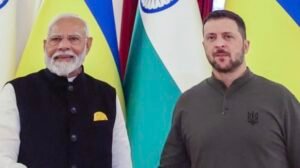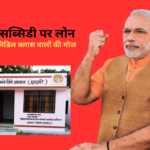Analysis: Modi’s Symbolic Ukraine Visit Aims to Strengthen Bilateral Ties

The visit by Indian Prime Minister Narendra Modi to Ukraine is strategically and symbolically significant. This historic journey is seen as a premeditated attempt to strengthen India’s diplomatic ties with Ukraine, given the continuing geopolitical unrest in Eastern Europe. Additionally, it conveys India’s impartial stance towards international affairs and its dedication to world peace and security.
A Historic Visit with Global Implications
With Ukraine’s independence in 1991, Modi’s visit to Ukraine is the first time an Indian prime minister has been there. This visit takes place at a pivotal moment for international diplomacy, as Ukraine’s war with Russia has brought the country to the attention of the world. India’s decision to interact with Ukraine at this moment is packed with significance, showing India’s commitment to retain a neutral stance while calling for discussion and peaceful resolution of issues.
Strengthening Bilateral Relations
The primary objective of Modi’s visit is to reinforce the bilateral ties between India and Ukraine. Historically, India and Ukraine have shared a robust relationship, particularly in areas like defense, trade, and education. Ukraine has been a key supplier of military equipment to India, and thousands of Indian students have pursued higher education in Ukrainian universities.
In recent years, however, the relationship has faced challenges, partly due to the ongoing conflict between Ukraine and Russia, one of India’s major allies. Modi’s visit is seen as an effort to reassure Ukraine of India’s continued support and interest in maintaining strong ties, irrespective of its relations with other nations.
During the visit, Modi is expected to engage in high-level talks with Ukrainian President Volodymyr Zelenskyy. These discussions will likely cover a range of topics, including trade, defense cooperation, and educational exchanges. Both leaders are expected to explore new avenues for collaboration, with a focus on areas like information technology, pharmaceuticals, and agriculture, where India has considerable expertise.
Balancing Relations with Russia
India’s relationship with Russia has been a cornerstone of its foreign policy since the Cold War. The two nations share deep historical ties, particularly in defense and energy sectors. Modi’s visit to Ukraine, therefore, is a delicate balancing act. It reflects India’s effort to navigate its complex relationships with both Russia and Ukraine without alienating either.
By engaging with Ukraine, India aims to demonstrate its commitment to a multipolar world order, where it can maintain independent and diversified relationships. This approach aligns with India’s broader foreign policy strategy, which emphasizes strategic autonomy and the pursuit of national interests without succumbing to external pressures.
Geopolitical Considerations
Modi’s visit also holds significant geopolitical implications. India has consistently advocated for a peaceful resolution to the Ukraine-Russia conflict, urging both sides to engage in dialogue. By visiting Ukraine, Modi underscores India’s position as a global leader advocating for peace and stability.
Furthermore, the visit is likely to resonate with Western nations, particularly the United States and the European Union, who have been critical of India’s close ties with Russia. By engaging with Ukraine, India signals its willingness to engage with all parties involved in the conflict, thereby enhancing its credibility as a responsible global actor.
Conclusion: A Diplomatic Tightrope
In conclusion, Modi’s visit to Ukraine is a calculated diplomatic move that underscores India’s commitment to strengthening bilateral relations while maintaining a balanced approach to international diplomacy. The visit is high on symbolism, reflecting India’s support for Ukraine during a critical period in its history. At the same time, it demonstrates India’s ability to navigate complex geopolitical landscapes, balancing its relationships with both Ukraine and Russia.
As the world watches closely, Modi’s visit could set the stage for a new chapter in India-Ukraine relations, one that is characterized by deeper cooperation and mutual respect. Whether this visit will yield tangible outcomes remains to be seen, but it undoubtedly reinforces India’s position as a key player in global diplomacy.





